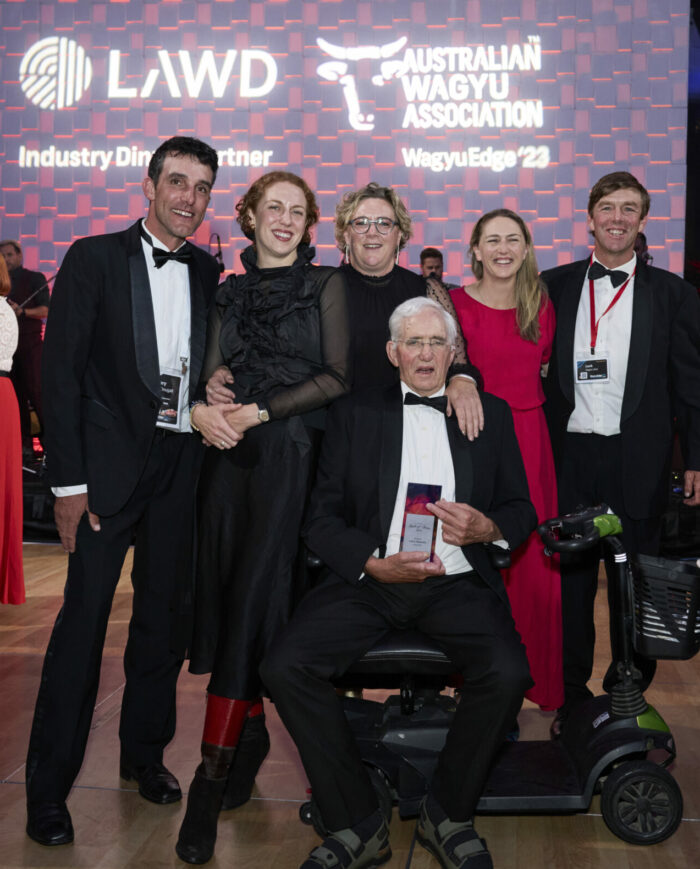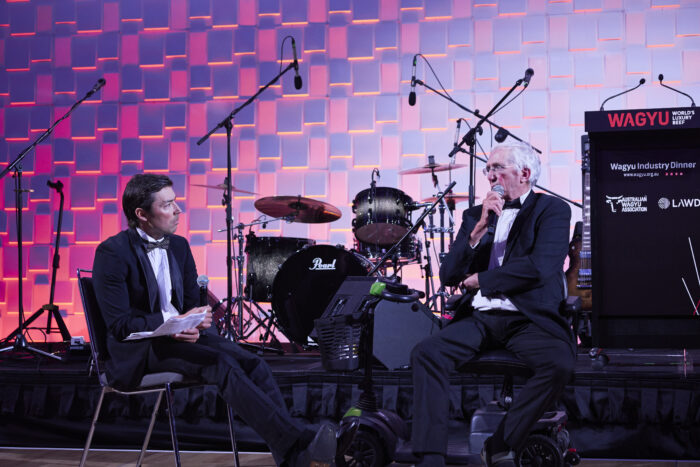As Lock Rogers pulls up in the main street of Guyra, NSW, the barista at the local cafe delivers his order to his ute. So too does the butcher and the chemist. Small gestures, but telling of the respect the revered cattleman holds in his hometown and throughout the Australian cattle industry.
The New England cattle producer wears many hats. Founder of Wattletop Angus and Door Key Wagyu. Father to five children, two of which have followed in his footsteps. Third-generation ‘Ga’ to his seven beloved grandchildren. Guyra’s most fanatical Cats supporter. Now, he adds another feather to his cap – Wagyu Hall of Fame inductee.

Mr Lock Rogers alongside his family at the Wagyu Industry Dinner in Sydney after accepting the 2023 Wagyu Hall of Fame Inductee
“The most important thing in the whole business is integrity, and the camaraderie and friendship in the Wagyu industry is fantastic so it’s a real honour to receive,” a humble Lock said.
Such is the honour that Lock joked it even beat winning last month’s heavy export lamb class at the annual Guyra Show. Now that’s saying something.
For the love of food and finances
Lock was introduced to the Wagyu breed in 1993 by Heather Suares. She hit every Angus breeder in the district with a proposal – to inseminate their Angus heifers in a buyback scheme to sell the F1 progeny at a 60 cent premium over and above the price they would receive for their Angus steer weaners.
Lock took the bait, but he was the only one. Like many in the district, Lock was, and still is, a passionate Angus man but two factors drove him to take the plunge. Money and food.
“I knew nothing about Wagyu but I could see the financial gain and I really love food. I love eating it, I love cooking it, and I started getting really interested in meat quality and marbling,” Lock said.
His passion for food is something his lifelong mate and fellow Wagyu breeder, Wal Perry can attest to. Whether by coincidence or strategy, Lock introduced the delicious meat to Wal’s plate the day before he suggested implanting Wagyu embryos.
“He’s so fussy about eating it hot that he made us stand out in the snow in his garage while he barbecued it,” Wal laughed.
“We were all rugged up and I remember thinking, ‘this bloody Wagyu, it’s just not going to be worth it’, but of course it was an absolute game changer for us.”
The pair went on to form an embryo relationship of over 25 years which remains strong today. Both Wal and wife Jen credit Lock’s generosity with his advice and knowledge as being instrumental in helping them start Trent Bridge Wagyu.
In the early days Lock used semen from Michifuku and Haruki2 ($10 a straw) and became the first to do a long-term projection and contract with the Whyalla feedlot in Queensland. He later supplied F1s to the Japanese live export trade for 10 years with both steers and heifers.
In 1998 Lock bought his first fullblood heifer and four fullblood bulls, and in 2007 Stanbroke first introduced Wagyu genetics via Door Key Wagyu. Today, he sells 100 bulls a year across Australia, from Tasmania to the Gulf of Carpentaria.
A man and his dog
Triumphs and success, highs and lows, Lock’s seen them all. In 2019 Door Key Wagyu was forced to destock by 35 percent as drought tightened its grip. Describing it as one of the most “demoralising and incredibly tough times” he’s faced, respite followed in the form of an unlikely saviour.
“Covid has been some of the best years of my life,” Lock reflected.
“It couldn’t knock me down as a farmer, I just put my dog in the back and went out to the farm. It rained for three years straight and commodity prices were on a terrific high so in the end we came out okay.”
Cattle at the core
It’s been a lifelong learning experience but Lock has never swayed from his dedication to producing a top quality product founded on a genuine love for cattle.
“As well as following the science and the technology, I think it’s very important that we still have fair dinkum cattlemen in the industry to really highlight the importance of real animal husbandry,” Lock said.
“You need to be ruthless on all sorts of performance; the animals you have need to be fertile, we join them all as yearlings, we cull everything that misses a calf every year.
“Structure is also incredibly important. The Wagyu breed is so focused on EBV’s, which are incredibly important, but they’re not everything. Structure, selection and basic cattlemanship is still very important.”
A true legend of the Australian cattle industry
Good people are integral to the industry and while Rogers said he’s been fortunate to have crossed paths with many, the humble cattleman has made an impact on even more. With his father a great mate of Lock’s, Australian Wagyu Association president Charlie Perry said Lock’s influence has been enormous.
“I’ve known Lock my whole life and he is honestly just one of the great cattlemen in the country,” Charlie said.
“His contribution to the beef industry in Angus and Wagyu has been enormous and he has been personally helpful to me and our business over the last 20 years in learning about pedigrees and how to breed Wagyu cattle.
“He’s also been instrumental in helping Wagyu breeder Michael Bavea develop his herd and helping him start a really good stud and that’s the hallmark of Lock in the industry – he’s generous with his knowledge, his experience, and he’s always had a very clear idea on the type of animal he wants to breed and stuck to that.”
Describing both himself and Lock as “extremely competitive” the pair thrive on friendly rivalry and never miss a chance to point out their best in the herd. And while Excel spreadsheets keep things running efficiently these days, Charlie recalls fondly the early years when his father’s business dealings with Lock would take “seven dinners and about 12 bottles of wine.”
Barely a year has gone past where Lock has missed the annual WagyuEdge. While he’s been telling all and sundry for many years that “this could be my second last Wagyu conference”, if his dancefloor antics are anything to go by, there’s many more to come.
“One of my favourite memories of Lock’s is seeing him at 3am on the dancefloor at a pub in Adelaide after a Wagyu conference,” Charlie said.
“There he is with his walker, bopping away with anyone who’ll take him. He’s got the most incredible outlook on life, he says yes to everything and he’s just a true character.”

AWA President, Mr Charlie Perry chats with Lock Rogers upon his acceptance of the award at the Wagyu Industry Dinner on the 21st April 2023
